In a world without laws and rules, chaos reigns. You find yourself in constant conflict, as survival turns into a personal battle. Trust erodes, leading to moral ambiguity. Without established structures, power struggles escalate, pushing nations toward violent confrontations. Security is no longer a given; it's your responsibility. Humanitarian crises emerge, with the absence of international law amplifying suffering. In this lawless environment, cooperation dwindles, leaving vulnerabilities exposed. Every move you make can provoke unpredictable reactions. If you're curious about how this chaos could unfold or what paths might emerge, there's much more to explore about this unsettling scenario.
Essential Insights
- A world without laws leads to chaos and anarchy, where personal security becomes an individual's sole responsibility.
- Power struggles arise as states engage in ruthless behaviors, increasing the likelihood of conflicts and wars.
- Absence of laws fosters humanitarian crises, as seen in the Iraq War, reflecting severe global ramifications.
- Trust in institutions erodes, resulting in societal instability and challenges in law enforcement and community relations.
- International cooperation becomes impossible, complicating responses to transnational issues like climate change and terrorism.
Concept of a Lawless World

In a world devoid of laws and rules, chaos reigns supreme, leaving states to traverse an anarchic environment where security becomes a personal responsibility. You find yourself in an atmosphere characterized by anarchy dynamics, where the absence of a central authority means there's no suprastate actor to enforce international norms. Each state adopts self-help principles, deciding what's just or necessary for its survival, leading to complex security dilemmas.
In this lawless domain, power struggles unfold as states engage in ruthless behaviors, prioritizing their interests over collective well-being. The lack of enforceable international law escalates conflicts, making war a more likely outcome. You witness humanitarian crises arising as moral relativism takes hold; the concept of right and wrong shifts based on power rather than ethical considerations. The Iraq War serves as a poignant example of how a disregard for international law can lead to severe ramifications on a global scale.
State sovereignty allows nations to reserve the right to take up arms, further complicating law enforcement and the protection of human rights. As tensions rise, the implications of this lawless world become starkly evident. The risk of conflict escalation threatens not only national security but also the dignity of individuals caught in the crossfire.
Without a framework for accountability, abuses of power can flourish, undermining democratic dynamics and leaving citizens vulnerable. Ultimately, traversing this chaotic environment requires a delicate balance between asserting state sovereignty and recognizing the urgent need for collective security to mitigate the dire consequences of a world without laws and rules.
Historical Context of Laws
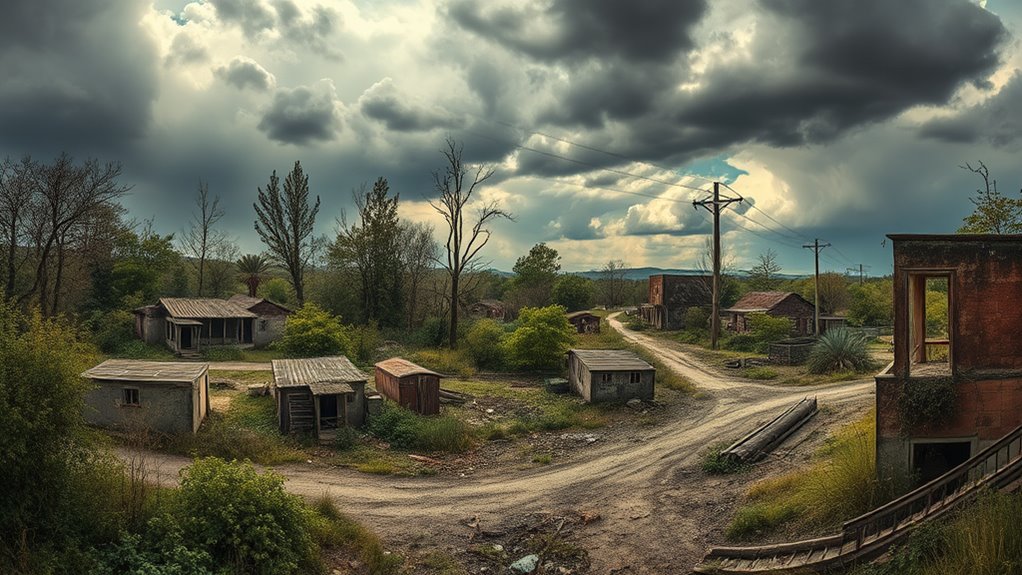
Tracing the origins of law reveals a fascinating journey through human civilization. You start with Hammurabi's Code, established around 1760 BC, which laid down 282 rules addressing everything from marriage to property rights. This early codification reflected society's values, emphasizing impartiality and consistent enforcement. Copies were distributed across Babylon, ensuring public awareness of the law.
As you move through history, the foundations of Medieval Jurisprudence come into play. King Henry II of England, in 1166, bolstered the royal courts by introducing the Assize of Clarendon, which paved the way for jury trials and reduced reliance on trials by combat. This period also saw the emergence of Merchant Law, created by traders to resolve commercial disputes, highlighting the need for legal structures in commerce. Islamic Law significantly influenced legal practices during this time, with its sophisticated jurisprudential developments.
In this evolving landscape, Common Law and Civil Law systems began to take shape. Common Law, rooted in Norman law post-1066, developed through legal precedents established by judges. Meanwhile, Civil Law Foundations emerged from codified statutes, particularly in Roman-influenced countries.
Ecclesiastical influence played a crucial role, as legal reforms derived from church procedures found their way into royal courts, shaping modern legal practices.
These historical milestones illustrate how laws have adapted to societal needs. From Hammurabi's Code to the intricacies of Medieval Jurisprudence, the evolution of legal systems has been fundamental in fostering order and justice throughout history.
Importance of Global Governance
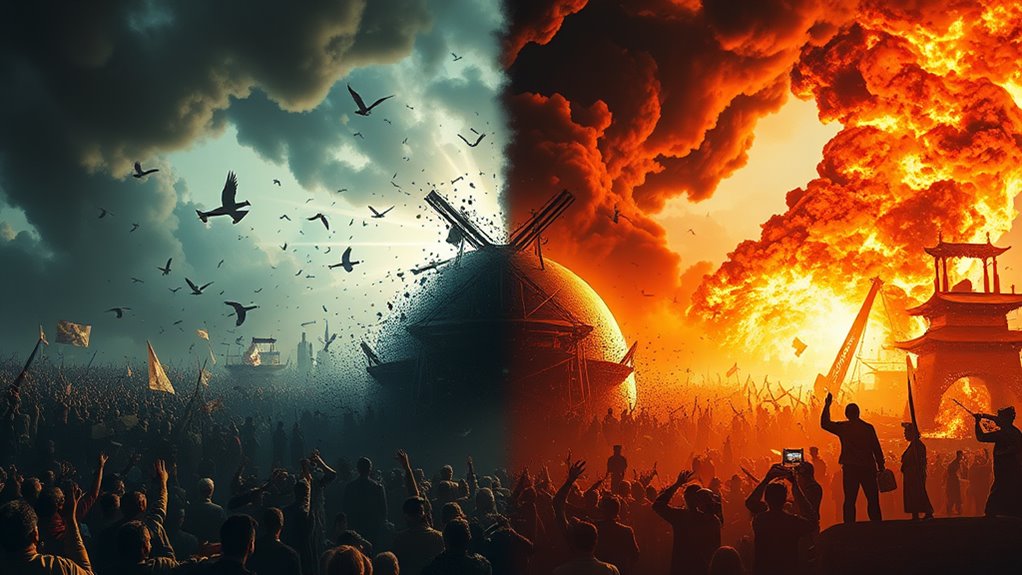
Global governance is essential for addressing the complex and interconnected challenges facing humanity today. Without it, issues like climate change, pandemics, and economic inequalities become insurmountable problems.
Here are three key reasons why global governance is critical:
- Transnational Issues Require Coordination: Problems like terrorism, infectious diseases, and environmental degradation don't recognize borders. Effective global governance fosters international cooperation to tackle these threats head-on. Global governance frameworks can help manage and regulate emerging threats.
- Promoting Peace and Prosperity: Through robust frameworks, global governance can help end armed conflicts and promote sustainable economic growth. With better coordination, we can achieve unprecedented levels of prosperity and human well-being.
- Inclusive Representation Matters: Many developing countries lack representation in decision-making bodies, which hinders effective global governance. Enhancing transparency and participation from diverse stakeholders, including civil society, is essential for equitable solutions.
Consequences of Eroding Institutions
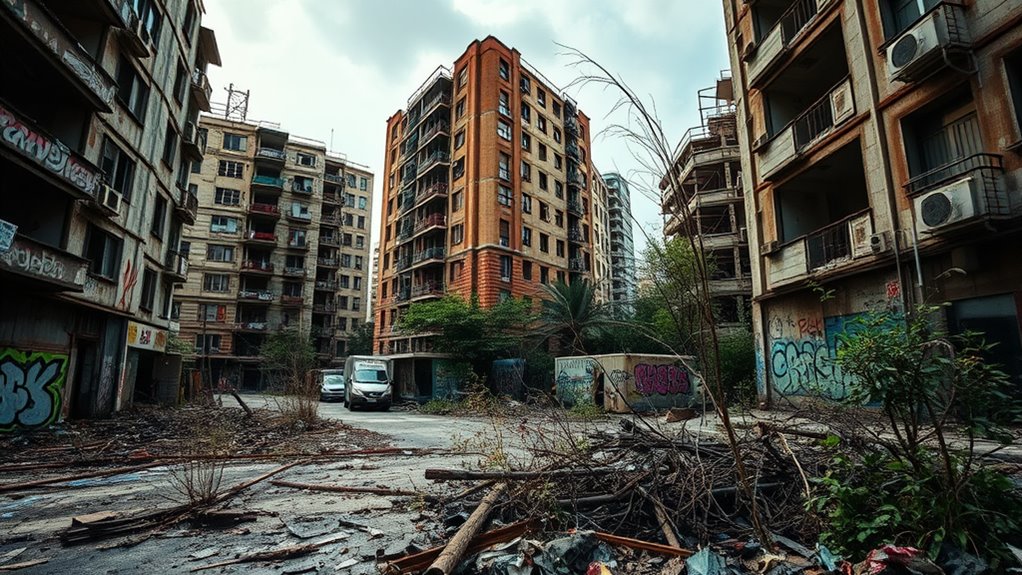
Eroding institutions undermine the very foundations of society, leading to a cascade of consequences that affect trust, economics, and social cohesion. You may notice that as institutional decay occurs, trust erosion becomes rampant, resulting in societal consequences that ripple across various sectors.
For instance, the decline in trust in institutions has dropped 22 percentage points in the U.S. since 1979, intertwining with polarization and social malaise. This growing elite distrust often morphs into anti-institutional rebellion, complicating governance challenges. In the context of global economics, the effectiveness of climate policies often relies on international cooperation, which can be undermined by weak institutions.
Economically, weakened multilateral institutions directly impact emerging markets, reinforcing slowing productivity and potentially leading to significant economic instability. As financial market volatility rises, inflation becomes a real threat, especially amid conflicts between major powers like China and the West. Such conflicts contribute to a shaky global security architecture and heighten the risk of conflict escalation.
Socially, you might observe how laws that clash with prevailing social norms often prove ineffective, pushing society toward lawlessness trends. Abrupt changes in legislation can lead to significant issues in social behavior, as the dynamic between laws and norms shifts unpredictably.
Without strong institutional resilience, the fabric of society frays, increasing the likelihood of civil unrest.
Challenges in Law Enforcement
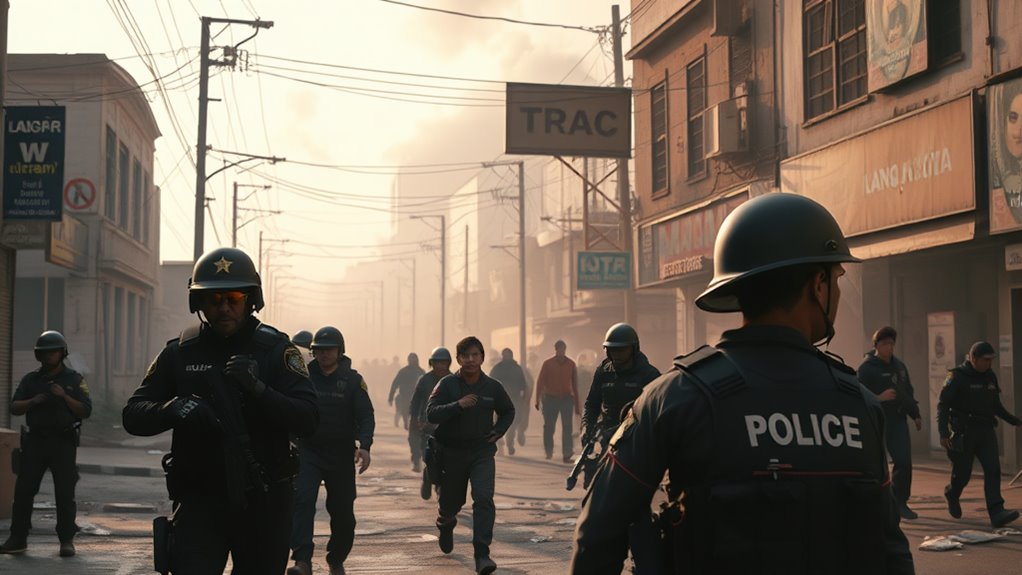
As law enforcement agencies endeavor to maintain public safety amid rising crime rates and dwindling resources, they're confronted with a myriad of challenges that complicate their mission.
The landscape of law enforcement is rapidly evolving, and several key issues stand out:
- Emerging Technologies: Agencies must adopt new tools like artificial intelligence and predictive analytics to enhance their operations.
- Budget Constraints: Limited funding affects everything from recruitment to technology investments, hampering their effectiveness.
- Community Relations: Building trust with the community is essential, yet societal divisions make this increasingly difficult.
With crime rates on the rise, effective resource allocation is more crucial than ever. Additionally, the integration of data-driven policing can help agencies optimize their strategies in the face of these challenges.
You face pressing training needs to guarantee personnel can manage digital evidence from smartphones and other devices, all while adhering to data privacy standards.
Budget constraints mean you often have to prioritize between hiring new officers and upgrading technology.
Recruitment challenges further exacerbate these issues, as retaining qualified personnel becomes a struggle in an environment of systemic bias and public mistrust.
Moreover, the management of digital evidence raises concerns about data security and privacy, complicating your ability to act decisively.
Balancing these challenges while fostering positive community relations is no small feat.
As you navigate these complexities, your commitment to human rights and good governance remains essential for maintaining public order and trust in law enforcement.
Impact on International Relations
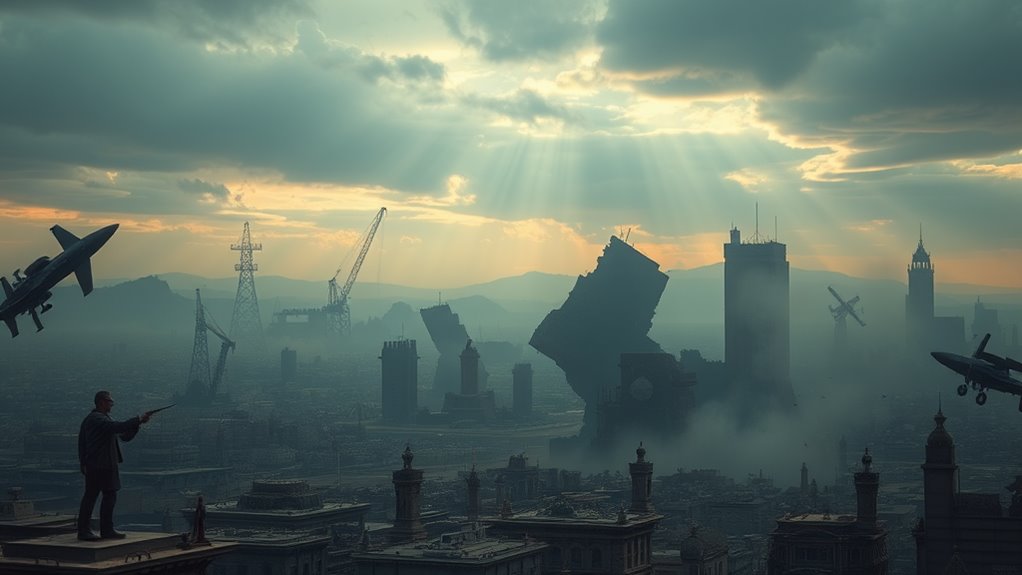
In a world without laws and rules, the landscape of international relations would change dramatically, forcing states to navigate an anarchic environment that prioritizes self-help. Without a suprastate authority, state behavior would shift towards power-maximizing strategies, as each government would feel compelled to provide for its own security.
This self-help regime could lead to significant security dilemmas, where the actions of one state to guarantee its safety provoke similar responses from others, escalating tensions. In this context, the absence of mutual compliance would further exacerbate the breakdown of trust among states, prompting a cycle of retaliatory actions.
Conflict resolution would become heavily reliant on the threat or use of force, as traditional diplomatic relations may collapse in the absence of enforceable agreements. Law violations would likely proliferate, especially as autocratic regimes disregard international compliance, prompting democracies to follow suit to avoid exploitation.
This noncompliance could destabilize cooperative strategies among states, undermining any remaining trust.
As states grapple with these anarchic consequences, the dynamics of power would continuously shift. You'd witness increased armed conflicts, especially in volatile regions, where multiple actors struggle for control.
The prevalence of non-international armed conflicts would further complicate the landscape, leading to fragmentation and potential spillover into neighboring areas.
Ultimately, in this lawless world, the interplay of state behavior, power dynamics, and conflict resolution would redefine international relations, making cooperation a rare exception rather than the norm.
The need for effective self-help mechanisms would prevail, leaving nations to fend for themselves amidst a chaotic, unpredictable global arena.
Economic Fragmentation Effects
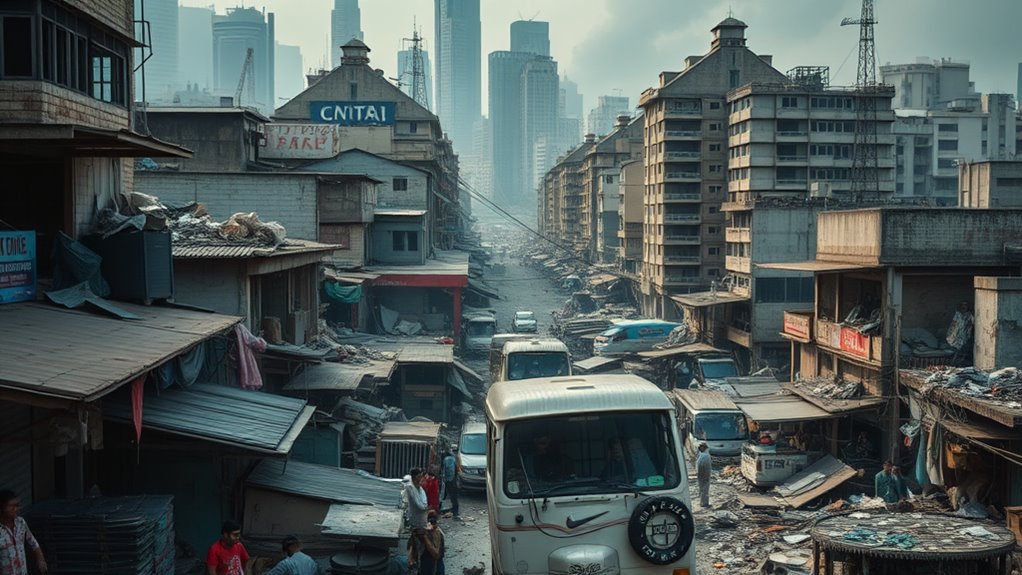
Maneuvering a world marked by economic fragmentation presents significant challenges for global markets. The effects ripple through various sectors, creating economic disparities that hit emerging markets the hardest.
You might notice the following issues:
- Increased Inflation Trends: Fragmentation raises prices, leading to tighter monetary policies.
- Trade Tensions: Escalating geopolitical risks result in reduced capital flows and heightened market volatility.
- Sectoral Shifts: Industries like manufacturing and finance suffer as trade slows down, particularly between major economies.
As fragmentation impacts the global economy, the adjustment costs can range from 0.2% to 7% GDP reduction, depending on the scenario. This uneven economic growth exacerbates disparities, leaving emerging markets particularly vulnerable.
You'll see that trade in goods between hypothetical East and West blocs has grown 4% slower than intra-bloc trade since the onset of the Ukraine war, demonstrating the real-world ramifications of these shifts.
Moreover, technological decoupling threatens to amplify these economic costs, potentially leading to an 8-12% output loss in certain areas. Firms face regulatory challenges that elevate their default probabilities and market valuations, driven by increasing trade tensions and protectionist attitudes.
Capital flows shift away from firms exposed to geopolitical risks, resulting in reduced asset valuations and market volatility.
In this fragmented landscape, understanding these dynamics becomes essential for maneuvering the complexities of a world without laws and rules.
National Sovereignty vs. Global Rules

Economic fragmentation not only disrupts markets but also intensifies the debate over national sovereignty versus global rules. As globalization progresses, you might find yourself grappling with sovereignty dilemmas that pit national interests against the demands of international norms. Globalization impacts your nation's ability to govern independently, leading to autonomy erosion.
Take a look at the following table:
| Aspect | National Sovereignty | Global Rules |
|---|---|---|
| Authority | States exercise control over their affairs | International institutions set standards |
| Decision-Making | Governments prioritize local needs | Compliance with global norms is required |
| Cultural Sovereignty | Emphasis on preserving local traditions | Globalization often homogenizes culture |
| Regulatory Challenges | States face difficulties in unilateral actions | Collective frameworks can complicate laws |
Your nation's sovereignty is often challenged by the rise of multilateral institutions that promote universal standards. While these frameworks aim to address global issues, they can undermine your state's autonomy. The need for cooperation in tackling problems like climate change and terrorism forces a balance between maintaining sovereignty and participating in collective action.
Ultimately, as you navigate these regulatory challenges, consider how globalization reshapes the landscape of national governance. The struggle between asserting cultural sovereignty and adhering to global standards will continue to define the future of international relations.
Cooperation on Global Issues
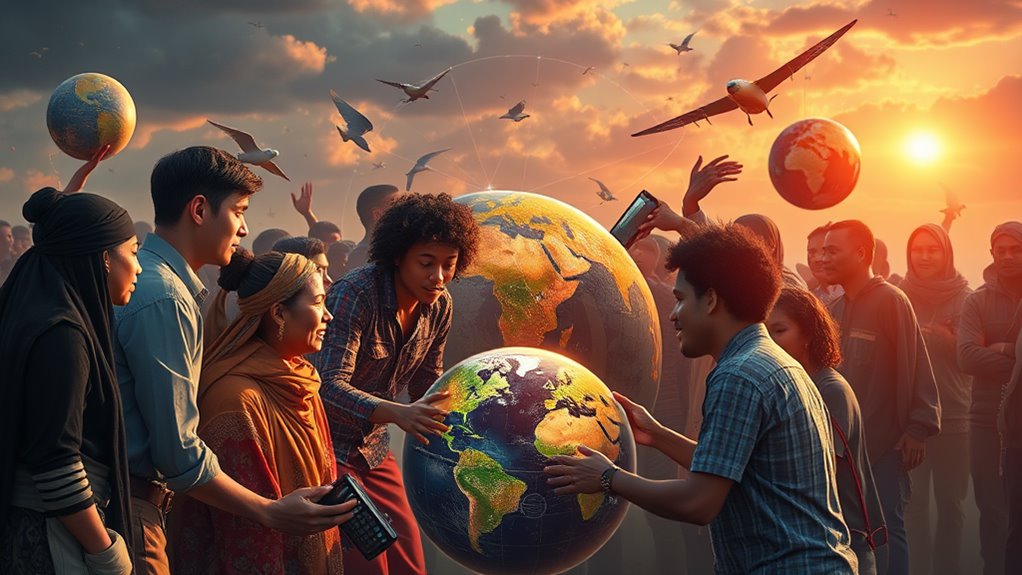
Global challenges like climate change and pandemics demand your active participation in cooperative efforts across borders. The success of initiatives like climate cooperation, pandemic preparedness, and food security relies on effective collaboration between nations.
Here are three key areas where your involvement can make a difference:
- Trade Agreements: These are essential for fostering economic collaboration and guaranteeing equitable access to resources, especially in times of crisis.
- Health Initiatives: Coordinated global responses to health emergencies can greatly enhance pandemic preparedness and improve public health outcomes.
- Environmental Treaties: Strong agreements on climate action are necessary to meet global targets like those outlined in the Paris Agreement.
International cooperation is fundamental in a world where national interests often overshadow collective goals.
For instance, the G20 conference plays a significant role in restoring trust and collaboration among major nations, particularly the US and China. Their partnership on climate cooperation can lead to meaningful advancements in environmental treaties and human rights.
You also need to recognize the importance of security partnerships and technology sharing to tackle global issues effectively.
The upcoming Summit of the Future in September 2024 aims to strengthen governance structures and enhance international collaboration. By participating in these discussions, you can help shape a world where cooperative efforts address pressing challenges and secure a sustainable future.
Embrace these opportunities to work together globally, as your active engagement is essential in steering a world without laws and rules.
Future of Multilateral Agreements
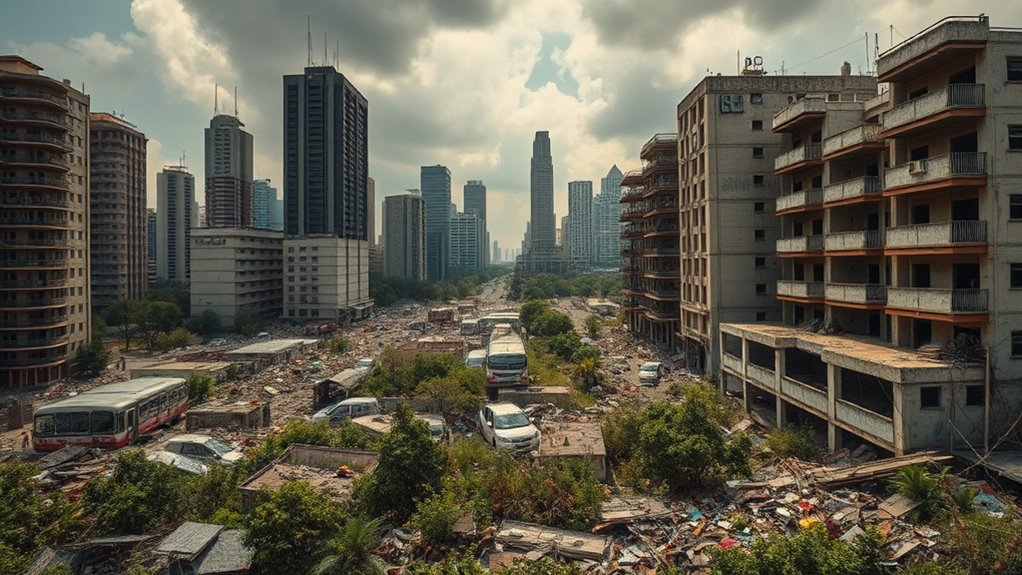
Envisioning a future shaped by effective multilateral agreements is essential for addressing the complex challenges of our time. As you consider the potential impact of multilateral reform, it's vital to recognize how inclusive governance can create frameworks that unite nations. The UN Secretary-General's call for the Summit of the Future emphasizes the need for legitimacy and fairness in global institutions, especially as geopolitical divides grow.
Key initiatives like the Pact for the Future turbocharge the Sustainable Development Goals and the Paris Agreement, promoting a just shift away from fossil fuels. By committing to involve young voices in decision-making, these agreements foster a sense of ownership and accountability.
Similarly, the Global Digital Compact establishes the first universal agreement on AI governance, ensuring that technology benefits everyone, particularly in developing countries.
However, challenges persist. Many developing nations feel sidelined by systems like the WTO, which often favor high-income countries. This disparity highlights the need for reforms that create equitable trade rules and address environmental concerns.
Ultimately, the Declaration on Future Generations serves as a reminder that policies must prioritize the interests of those yet to come, advocating for human rights and gender equality.
As you think about the future, consider how these multilateral agreements can shape a more collaborative world. Embracing inclusive governance and reforming outdated systems can enhance cooperation, paving the way for sustainable solutions that benefit all.
Scenarios for Global Order
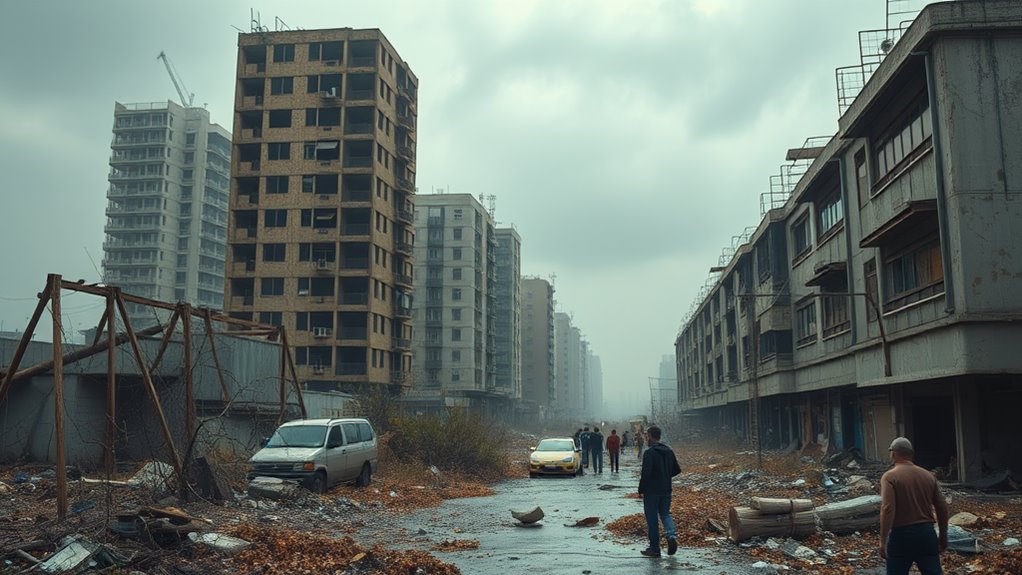
As the landscape of international relations evolves, the future of global order is increasingly uncertain. You might find yourself maneuvering through several possible scenarios that could reshape the world as we understand it. Here are three scenarios to evaluate:
- BRICS+ Led Global Order: Emerging coalitions like BRICS+ are challenging the existing neoliberal framework. These nations advocate for multipolarity and non-interference, greatly affecting trade and development financing.
- Bloc-Based Global System: The world could split into various blocs, each with shared economic and security interests. This fragmentation may lead to economic rivalries and conflicts, emphasizing the need for mutual security alliances.
- Alternative Global Governance Models: Countries within BRICS are pushing for a new order, aiming to reform the Bretton Woods system while advocating for diverse global leadership. Institutions like the New Development Bank exemplify this shift.
These shifting dynamics signal a notable change in international relations. As emerging coalitions gain influence, the existing structures struggle to adapt, leaving room for new alliances and governance models.
While the future remains uncertain, it's clear that the quest for a more equitable and representative global order is underway.
How will you position yourself in this rapidly changing landscape? The choices made today will shape tomorrow's world.
The Role of Technology
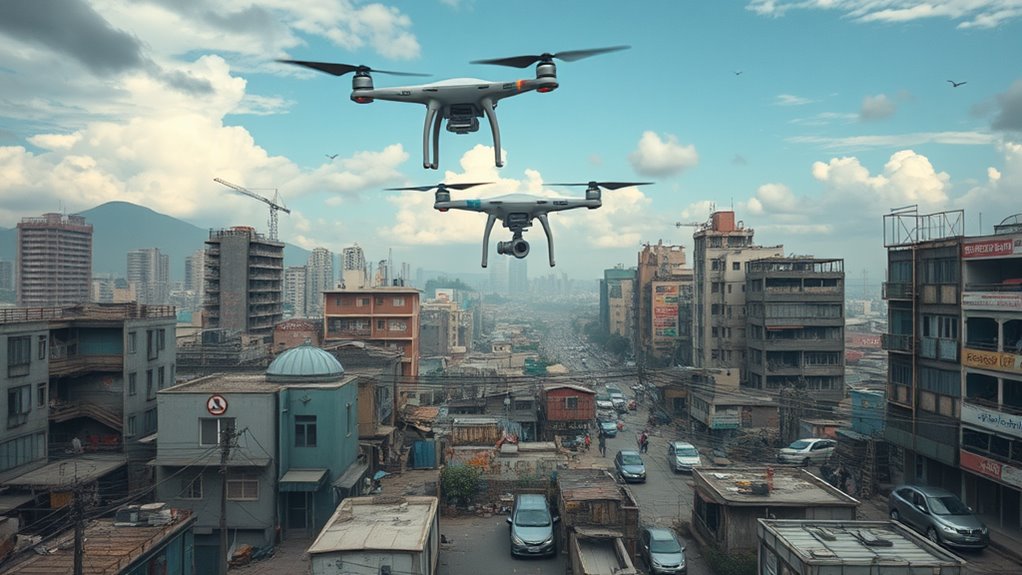
In today's world, technology plays a pivotal role in shaping power dynamics and governance across nations. The rapid technology evolution, including AI, biotech, and advanced manufacturing, is essential for setting global standards and rules. Countries are in a constant race to innovate, impacting military, economic, and technological spheres.
You need to recognize that strong alliances with like-minded partners are vital for leveraging this innovation power effectively against disruptor nations like North Korea and China.
However, while technology can promote freedom of expression and hold governments accountable, it also poses significant challenges to human rights. Surveillance tools and biased AI can perpetuate discrimination, particularly against marginalized groups.
As a member of society, you should be aware of the implications of Big Tech's role in spreading misinformation, which can have catastrophic consequences.
The effects of technology extend to social structures and relationships, transforming how you communicate and interact daily. High-performance computing and AI redefine work and professional norms, creating new dependencies and altering perceptions of security.
Yet, different societies adopt these technologies at varying speeds, influencing their social fabric.
Frequently Asked Questions
What Are the Potential Benefits of a Lawless World?
In a lawless world, you might experience anarchy advantages like unprecedented freedom and exploration.
Without restrictions, you could express yourself creatively and innovate without legal boundaries. The potential for self-governance might empower you to make choices based on personal responsibility rather than fear of punishment.
This environment could encourage mutual cooperation, allowing you to navigate interactions without hierarchical constraints, fostering a sense of community based on altruism rather than enforced compliance.
How Would Individuals Navigate Daily Life Without Laws?
You might think steering through daily life without laws would lead to chaos, but individuals often rely on their social order and moral compass to guide them.
You'd form personal relationships, creating trust and cooperation within your community. By establishing informal agreements and relying on shared values, you'd find ways to resolve disputes.
Mutual dependence would foster stability, allowing you to thrive in a world where laws are absent, yet community bonds remain strong.
What Historical Societies Functioned Effectively Without Formal Laws?
You might find that many historical societies functioned effectively without formal laws. Anarchist societies thrived on mutual aid and voluntary cooperation.
Indigenous governance systems often relied on community traditions and elders for mediation. Stateless communities maintained order through social norms rather than written codes.
Primitive tribes, too, resolved conflicts through communal decision-making, emphasizing harmony and collective well-being. These models show that governance can exist outside formal legal structures, prioritizing relationships over regulations.
How Could a Lawless World Impact Cultural Practices?
In a lawless world, you'd witness significant shifts in cultural practices.
Social norms could adapt rapidly, as people may begin to accept behaviors once deemed unacceptable.
Cultural adaptation might become necessary for survival, leading to a blend of old and new values that challenge traditional beliefs.
You'd see communities struggling to maintain cohesion, as differing perspectives clash, possibly resulting in confusion and conflict over what's considered right or wrong in this evolving landscape.
What Philosophical Arguments Support a World Without Laws?
Philosophical arguments supporting a world without laws often stem from anarchist philosophy and moral relativism. You might embrace the idea that individuals can govern themselves, prioritizing personal responsibility and autonomy over imposed rules.
Anarchist thinkers argue that hierarchies and laws perpetuate oppression, while moral relativism suggests that ethical standards vary by culture. This perspective encourages you to pursue unique paths, fostering creative solutions to conflicts without reliance on traditional legal frameworks.
